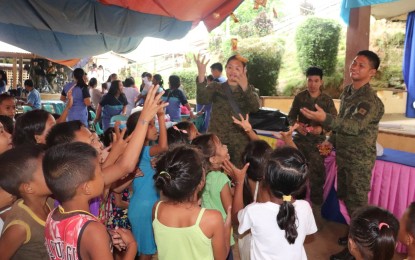
OUTREACH. Soldiers distribute candies to children during a community support program in Pinabacdao, Samar. The army has incorporated mobile birth registration in its outreach activities in rebel-infested communities in Samar. (Photo courtesy of 46th Infantry Battalion)
TACLOBAN CITY -- In two Samar towns, the military’s campaign against insurgency includes helping villagers gain their legal identities.
Lt. Col. Rhomel Langcauon, commanding officer of the Philippine Army’s 46th Infantry Battalion, said on Thursday that one of the most common problems among residents of remote Samar communities is the absence of certificates of live birth.
“About 30 to 40 percent of residents in far-flung villages have no birth certificates, a very important piece of document that every Filipino must-have,” Langcuonon said in an interview.
He recalled hearing stories of student-athletes barred from joining competitions since they do not have a birth certificate.
The teens in remote villages here are deprived of several opportunities due to lack of legal documents, making them vulnerable to New People’s Army recruitment, the army official added.
This prompted the military to organize an outreach activity with free mobile birth registration in partnership with local governments.
One of the services provided is free on-site registration of births in remote communities. This initiative has been carried out in rebel-infested communities of Pinabacdao and Calbiga, Samar.
A birth certificate is a vital record that will establish the birth of a child. It authenticates one's identity and nationality and assists with obtaining government-issued identity documents, such as a passport or driver's license.
Holding a birth certificate makes it easier to prove citizenship, according to the Philippine Statistics Authority (PSA).
“The problem of the lack of birth certificate is very rampant in these two towns. Aside from this, there are also parents who are not yet legally married. We asked the mayors to sponsor a mass wedding for these couples who have been living together for decades,” Langcuonon added.
Extreme poverty, distance from the town center, and the lack of awareness on the value of legal identity documents are among the reasons these families do not secure these documents.
The provision of copies of birth certificates is part of the community support program, an initiative of the military to facilitate the government’s development programs by hearing issues and concerns of villagers and bringing them to the attention of concerned government offices.
Early this year, the PSA reported that five million Filipinos nationwide remain unregistered with the agency. Almost 40 percent of the total unregistered Filipinos are children aged 0-14 years old. (PNA)
